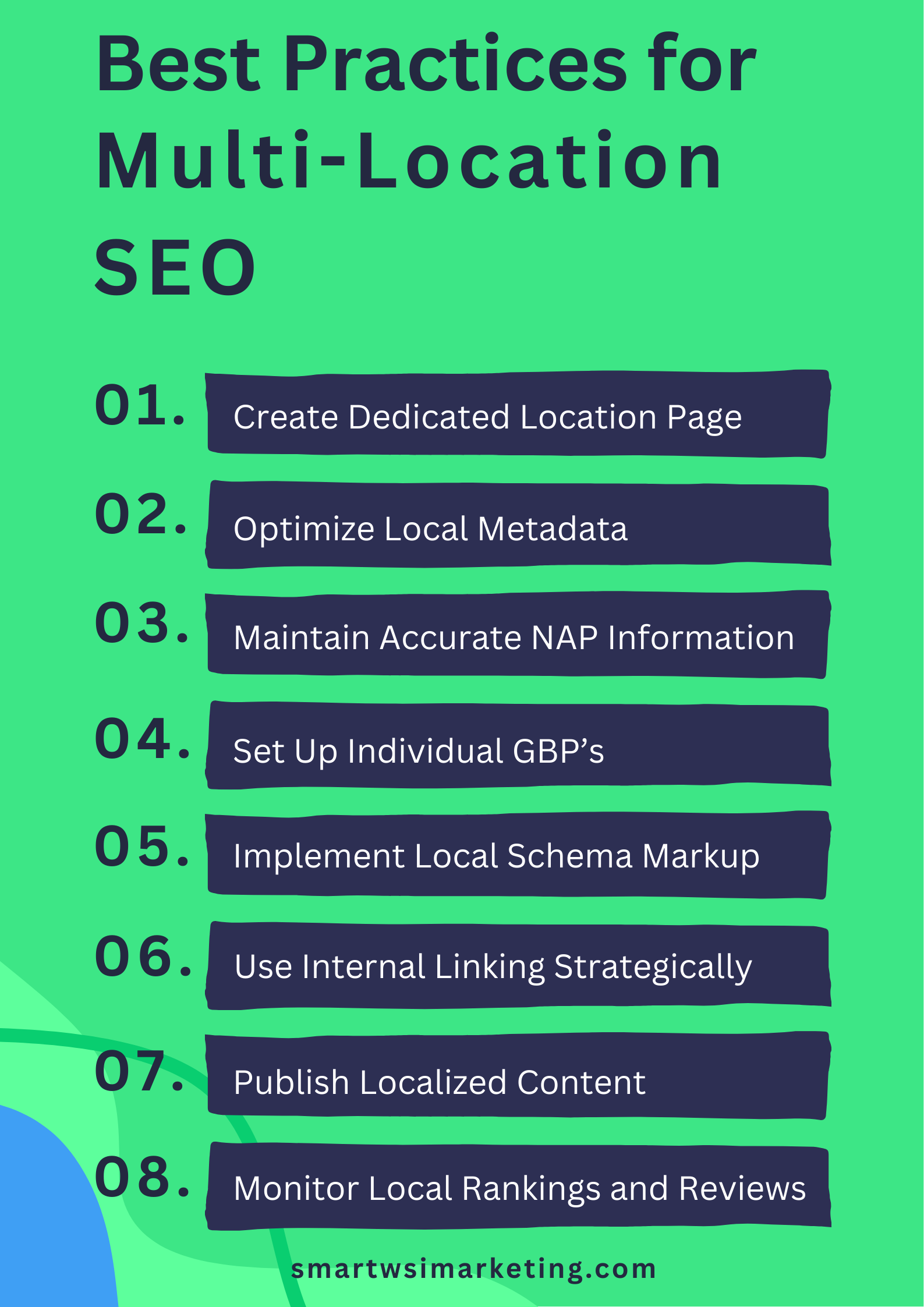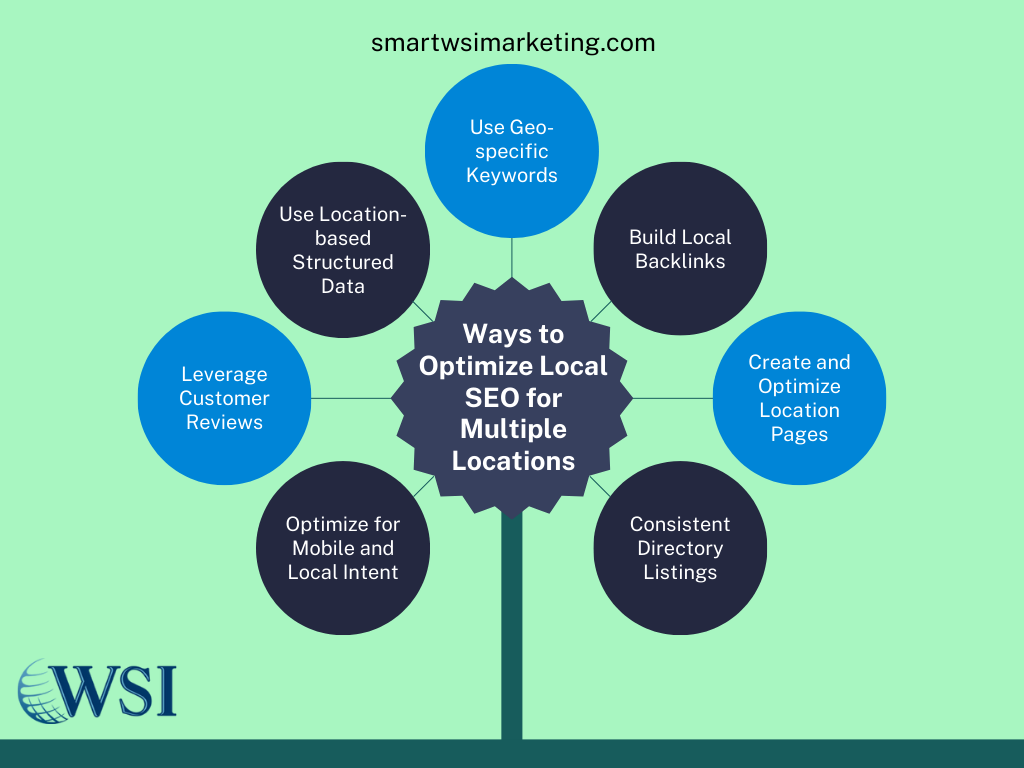
 STRATEGY CALL
STRATEGY CALLPosted Feb 15, '21; Updated Nov 6, '24

If your business has multiple locations you can still use local search engine optimization (SEO) techniques to improve your website’s ranking on search engine results pages (SERPs). Whether you have 2, 20, or more physical locations, or if you just service different areas, local SEO for multiple locations is a smart strategy for reaching your intended audiences. Smart WSI Marketing is an award-winning Edmonton SEO company that can help optimize your website so you never miss a customer wherever they may be.
Local SEO is exactly what it sounds like: getting your website ranked when people are searching for the products and/or services you offer
within a specific locality. The goal is to get your site ranked better for a local audience rather than a global one. Why is it that
important? 80% of consumers used the internet to find
information about local businesses weekly, with 32% doing so daily. Additionally, 88%
of people who conduct a local search on their smartphone visit a physical place within 24 hours, and 18% of those searches result in a purchase.
Those are some pretty compelling numbers!
Multi-location SEO is the process of optimizing a website to rank for local search queries across multiple geographic areas. It involves
creating structured content, location-specific pages, and accurate business listings to ensure each service area or storefront appears in
relevant local search results.
An effective local SEO strategy is essential for businesses with two locations or more, as it helps improve visibility in Google Search and Maps for users searching near those areas. Key components include consistent NAP (Name, Address, Phone number) data, location-specific metadata, localized content, and integration with tools like Google Business Profile.
Tools like Google Analytics and Google Search Console help track performance, while schema markup helps search engines differentiate each
particular location your business serves.
There are several different options when using local SEO techniques for multiple locations and which ones you choose depends on market factors, local competitors, and even if you do business in areas that speak another language. An experienced SEO agency can help you decide which path is right for you.
The good news is you don’t have to dramatically change the local SEO process you’re using now to rank well in multiple locations. Here’s what you do need to do.
If you operate global locations or offer goods and services in places where people speak another language, it’s important to research
how local SEO varies from province to province and around the world. For example, in Quebec where French is the official language, language
nuances may affect search engine optimization strategies.
To achieve consistent results across multiple service areas, follow these best practices for structuring, optimizing, and managing your local SEO efforts effectively.

Each location should have its own page with unique content, including address, phone number, hours, services offered, and an embedded map.
Avoid duplicating content across pages.
Include the city or service area in page titles, meta descriptions, headers, and URLs (e.g., /services/seo-edmonton/).
Ensure name, address, and phone number are consistent across your website, Google Business Profile, and all online directories.
Create and verify separate GBP listings for each physical location. Use accurate categories, business hours, and local photos.
Use structured data to signal each location’s business information to search engines. Include address, phone number, business type, and
geo-coordinates.
Link location pages from relevant service and regional pages to distribute authority and improve crawlability.
Include blog posts or service updates relevant to each area you serve. This supports long-tail keywords and reinforces topical relevance.
Track local keyword positions separately for each location and respond to customer reviews promptly to build credibility.
To improve search rankings and drive traffic to your website from different regions, apply the following methods to optimize your multi-location SEO approach.

Include city, neighborhood, or regional keywords in headings, body content, and metadata to align with local search intent.
Earn links from local chambers of commerce, news sites, business directories, and community partners to boost local authority for each
location.
Develop unique, content-rich pages for each service area. Include service details, local testimonials, and embedded Google Maps.
Submit each location to reputable directories (e.g., Yelp, YellowPages, BBB) and ensure consistent NAP information across all platforms.
Ensure pages load quickly, are mobile-friendly, and include features like click-to-call and location-based directions.
Encourage location-specific reviews on Google and other platforms. Respond to reviews to improve trust and engagement signals.
Add schema markup for LocalBusiness and address information to help search engines understand and rank each location correctly.
Failing to address the challenges below can limit your ability to appear in rankings in local search results and reduce visibility across
locations across your service areas.
Using the same content with only the city name changed can harm rankings. Each location page needs unique, relevant information.
Mismatched names, addresses, or phone numbers across your site, GBP listings, and directories can confuse search engines and users.
Failing to build dedicated pages for each location or having thin content on them limits local visibility and search relevance.
Without location-specific backlinks, search engines have fewer signals to validate your authority in each service area.
If location pages aren’t properly linked from service pages or navigation menus, they may not be indexed or prioritized by search engines.
Using a single GBP for multiple locations violates Google’s guidelines and weakens your ability to rank individually in local packs. Each
business location must be submitted separately to avoid penalization.
Missing structured data makes it harder for search engines to associate each page with a geographic location and business category.
Today, every business needs a digital marketing strategy that amplifies its online presence, including across multiple locations. Smart WSI Marketing is an Edmonton digital marketing company helping local businesses with their multi-location SEO strategy, no matter how many locations they serve. To learn more about local SEO for multiple locations, contact us today.



